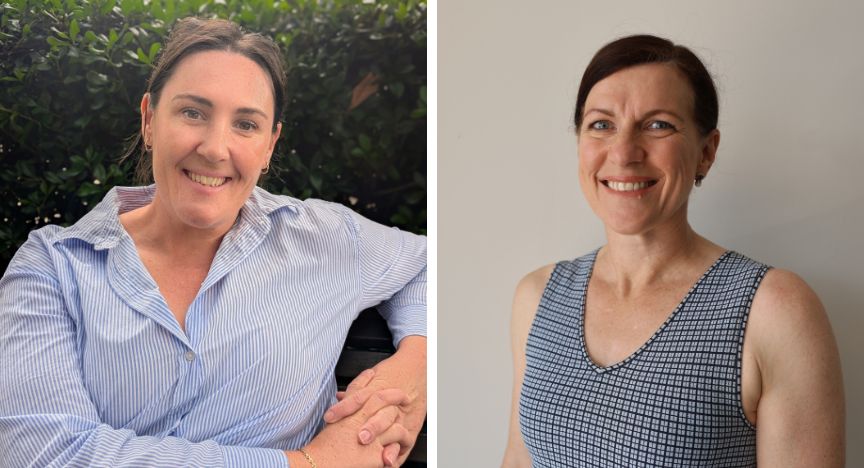 Elisha McGuiness from Office of Rural and Remote Health and Dr Clare Walker of Central West HHS
Elisha McGuiness from Office of Rural and Remote Health and Dr Clare Walker of Central West HHS
Nearly 200 people will attend a rural maternity summit at the Civic Centre in Longreach from 3-6 April, with delegates hailing from throughout Queensland, other states, and New Zealand.
The summit is a joint initiative of the Central West Hospital and Health Service and the Department of Health’s Office for Rural and Remote Health and Health Improvement Unit.
The summit is open to all clinical members of the maternity team from rural and remote maternity services anywhere in Australia, including students and trainees or those interested in a rural and remote career.
Longreach Hospital Acting Director of Medical Services Dr Clare Walker is a member of the summit’s organising committee.
“As a rural health service, we recognise the importance of delivering safe and sustainable birthing services where possible to reduce the need for rural women to travel too far from home to give birth,’’ Dr Walker said.
“The summit will bring educators and policy makers to Longreach to talk about the specific challenges and opportunities around rural maternity services across Queensland, as well as provide hands-on training and education opportunities to clinicians.
“Across the four days there will also be 15 different workshops that participants can participate in, covering topics such as perineal repair, neonatal stabilisation, managing difficult births, cultural capability, and how to work effectively as a team.
“We hope that this summit will bring some insights into the challenges of delivering maternity and birthing services in rural areas, highlight successes and promote debate on innovative models of care that can improve access to birthing and maternity services in rural areas.’’
Office of Rural and Remote Health Executive Director Elisha McGuiness said maintaining sustainable maternity services in rural Queensland was a challenge.
“However, it is something that we are committed to getting right,’’ she said.
“The summit was born from a passion shared by Dr Clare Walker and Dr David Walker to showcase their community and the wonderful collaborative work that Central West Hospital and Health Service is doing to provide high-quality maternity care to the people of the Central West.
“This summit brings people together from all levels and professions and sharing not just the challenges, but the opportunities for the provision of maternity services to rural communities now, and into the future.
“I’m delighted that we’ve been able to bring this event to Longreach. The enthusiasm we’ve seen from across Queensland has been overwhelming and speaks to the dedication that our maternity clinicians have to their craft.
“A big thank you to the Longreach community for hosting us.”
Dr Walker said the excellent maternity and birthing service available to Central West women at Longreach Hospital would be amongst the rural maternity successes to be highlighted at the summit.
“The Longreach maternity and birthing service provides primary maternity care for women and families based on a continuity of care model,’’ she said.
“In the Central West, maternity care providers include midwives providing care via a continuity of care midwifery group practice model, GP obstetricians, and the allied health care team, with ongoing follow up and referral to child health services.
“Women also have the options of shared care with their regular GP.
“For a woman who lives out of Longreach, her midwife will liaise with the local midwifery staff in her community.
“We also have on-site accommodation at no cost at Longreach Hospital for women in the lead- up to giving birth from 37 weeks onwards.
“This is particularly convenient for women who live away from Longreach.’’
Longreach Hospital birthing service facts
- On average, between 60–100 babies a year are born at Longreach Hospital.
- The maternity unit offers three post-natal rooms, a birth suite, a maternity assessment room, a baby assessment room, and an equipment room.
- The three single rooms on the maternity ward are big rooms with an ensuite but also an area where mums can bathe their babies.
- The birthing suite importantly also allows space for family to be with a woman and the birthing team during the birth of a baby if they choose.
- A lower risk birthing service, such as Longreach, allows women who do not have a complex medical and obstetric history and who do not experience a complex antenatal period to be cared for locally if they choose.
- Women with higher risk pregnancies are supported by the Central West Hospital and Health Service’s maternity services to travel to and/or access virtual care at Rockhampton or another larger centre where they can receive the care and access to specialised higher risk birth services they require.
- Some women may also choose to give birth elsewhere to be closer to family and friends outside the region, or because they want to birth at a private facility, even though they may be clinically suitable to birth at Longreach.
ENDS
For further information contact:
James Guthrie
Principal Media Officer, Rural and Remote Qld Media Unit, Strategic Communications Department of Health
(07) 3708 5379